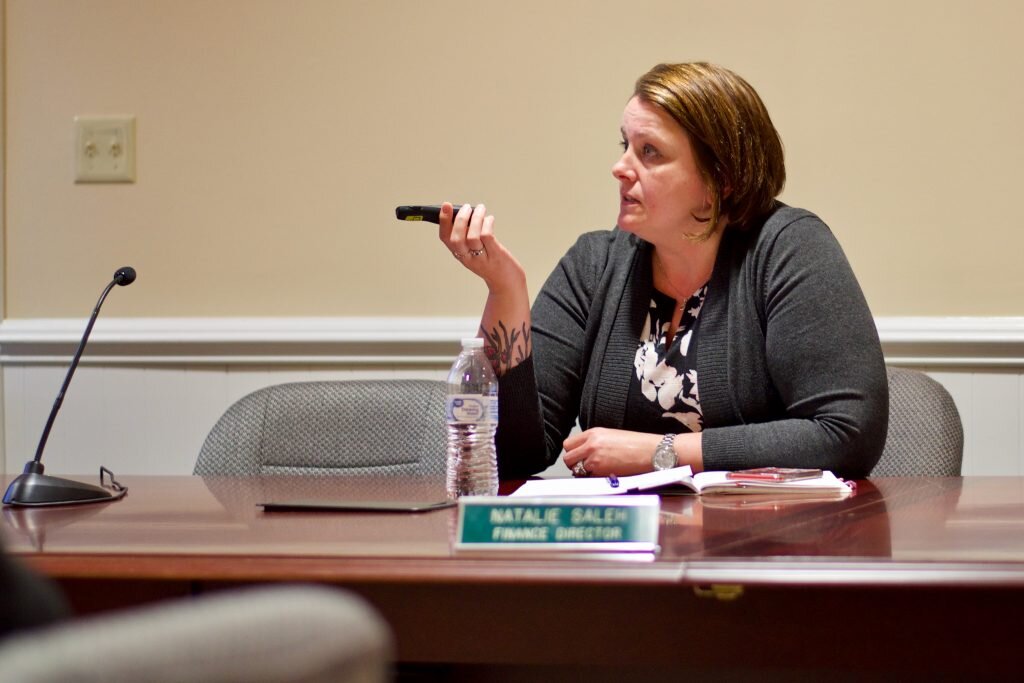
JOSH DAVIS/BAYSIDE GAZETTE
Berlin Finance Director Natalie Saleh on Monday provides a mid-year budget report.
By Josh Davis, Associate Editor
(March 28, 2019) A mid-year budget report provided Monday night by Berlin Finance Director Natalie Saleh suggests the town is being conservative while facing certain property tax and utility fee increases during the next fiscal year.
Town officials are also facing higher levels of criticism from an increasingly engaged public.
Saleh said the town is trying to be frugal, because “any extra [funds] will basically go back to reserves.”
According to slides shown during the presentation, total revenues for the year were at 68 percent of what was budgeted, about $3.8 million, while expenses so far, through the first six months of fiscal 2019, were 45 percent, or roughly $3.2 million.
Electric fund revenues to date were at 44 percent of budget, versus expenses at 40 percent. Water fund revenues were 41 percent of what was budgeted, while expenses were 39 percent, and the sewer fund showed six-month revenues at 32 percent of budget and expenses at 38 percent.
Bucking the trend was the stormwater fund, where only 6 percent of projected revenues had been collected and 5 percent had been spent. Saleh said that was because the budget included grants for capital projects that had not been received. She said about $1.3 million was budgeted for revenue and $1.6 million was earmarked for expenses, but so far only about $77,000 had been collected and $83,000 spent.
Mayor Gee Williams said money collected each year through the stormwater utility had during the last several years been leveraged into millions in state and federal stormwater grants. The town’s efforts to obtain grants this year was mostly unsuccessful, but Williams said the expectation is the money will eventually come.
Resident Jason Walter said it was unusual for a small municipality to have a stormwater utility and asked just how competitive those grants are.
Town Administrator Laura Allen said two grant applications were submitted last summer and included in the budget. One of those was a $1 million application with the Maryland Department of Natural Resources for improvements around Graham Avenue, Grice Street and Nelson Street.
“That was unsuccessful and what I understand, from talking to DNR, is that was one of 26 applications,” Allen said.
“We’re optimistic that over time we’re going to get the money that we need, it’s just not something we can automatically count on,” Williams said. “I don’t think we’re thinking we’re ever going to be shut out, because part of what they take into account is what we’ve done so far.”
Williams said about $3 million had already been spent on stormwater improvements, with at least $3.5 million more in improvements needed.
Allen said that number is closer to $10 million. West Street improvements alone, she said, were estimated to cost about “$3 million plus.”
Walter asked about stormwater improvements near Henry’s Mill, and Councilman Zack Tyndall said a grant application was submitted, but was not successful.
“But, it’s still on the list of things to be completed,” he said.
Water said stormwater management systems in his neighborhood had largely failed.
He also asked about town personnel expenses, which he said were just shy of $4 million.
“We’re very high on state averages for personnel costs,” Walter said.
“That’s a matter of what you think is a correct percentage,” Williams said, adding the total budget was more than $18 million.
Others were critical of stormwater spending while the town is considering annexing new property, and raising some taxes and fees.
Williams said there were previously no stormwater standards in the town, and any new annexed properties would have to adhere to new, much stricter, standards.
“We have to … spend a long, long time fixing all the places that need stormwater upgrades, but anything that comes in new can’t add to the problem, because they all have to meet new, higher standards and be self contained,” Williams said.
“Even if it meets your standards, it’s still going to put more strain on the system that’s already in place, if you annex,” resident Larry Smith said.
“You’re perfectly entitled to believe that,” Williams said. “[But assuming] that nature is going to fix these things all by itself, regardless of [what] is annexed or not, is just not happening.”
Williams later said the town is struggling to meet “much higher expectations” than were present just a few years ago.
“That’s fine. There’s nothing wrong with that,” he said. “I think it’s good that we are challenged to meet higher expectations … it’s a moving target, but I think whoever is sitting here will have that same challenge.
“The public input is, the more you know, the more you can provide helpful feedback. We encourage that,” he added.
